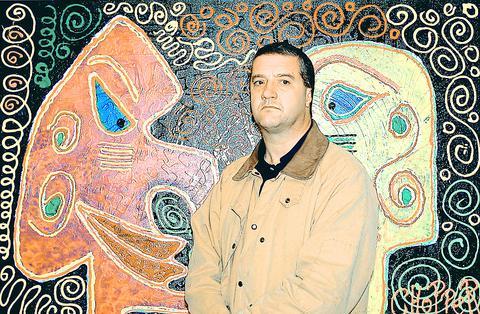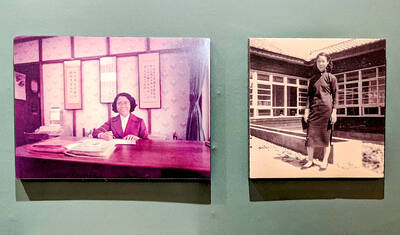One of Australia's most notorious criminals has channelled his anger into painting to become the Australian art world's latest pinup.
Twenty-seven paintings by Mark "Chopper" Read, a former gangland thug who won his nickname after he had a cell-mate hack off his ear lobes with a razor blade, were snapped up within 24 hours of his inaugural exhibition opening this month.
Read, who spent 23 years behind bars between 1971 and 1998 for kidnapping and malicious wounding, said he is surprised his work is in such demand from a public that has often shunned him for building celebrity status out of his gruesome past.

PHOTO: REUTERS
"It's a surprise that other people like what I'm doing. I took up painting as a form of therapy, to help me relax, so that instead of getting angry and shouting I went out into the backyard and painted," Read, 48, told Reuters.
"I find painting wonderful, better than a psychiatrist."
Some people may find it hard to believe that Read, once a feared mobster, now spends his spare time behind a canvas, advocating the benefits of acrylic paints over oils, but for people who have followed his career it is no surprise.
After all, he has made a living out of his bad-boy image.
For the past 12 years Read has pursued a career as a cult crime writer and now tours clubs around Australia as a stand-up comedian even though his bizarre history, portrayed in the gritty, award-winning film "Chopper" in 2000, is far from funny.
This is a man who admits a bit too readily that he has been questioned over 38 murders in the past 30 years, either as a suspect or as an acquaintance of the victim.
He has been convicted of numerous assaults and of torturing his victims but never of murder, although he has boasted of involvement in killing some 19 fellow criminals, calling them "tactical necessities".
"I'm no murderer. I'm just a garbage disposal expert," he wrote in his first autobiography from jail in 1991, after describing how he killed a drug dealer who had bragged of overdosing about 50 prostitutes.
It was this book that elevated Chopper to cult status in Australia, a country founded by the British over 200 years ago as a collection of convict colonies. But Read, with a twinkle in his eye, remains elusive when pushed on fact and fiction.
He has since published another 10 books, including several volumes of memoirs criticized for glorifying violence such as How to Shoot Friends and Influence People, some novels and even a children's book called Hooky the Cripple: The Grim Tale of a Hunchback Who Triumphs.
The books have sold incredibly well, cementing an Australian love affair with crime that dates back to convict days. Some of the nation's earliest criminals, notably bushranger Ned Kelly, are treated as folk heroes.
Recently Read has also done comedy gigs, regaling audiences with chilling autobiographical tales while assuring nervous listeners he has never hurt a woman, child or innocent person.
But his foray into art was a new venture -- and one he swears came about unintentionally, after his family persuaded him to exhibit the paintings he had produced over the past year.
Curator Denis Chapman, who showed Read's work this month at Dante's Upstairs Gallery in Melbourne, said he was stunned by the success of "Chopper Art by Mark Brendan Read" which includes some portraits and abstract works with text.
Demand has been voracious. The larger works sold for A$4,500 (US$2,920) and the smaller pieces for A$1,500, many of them imitating the 200 or so tattoos covering Read's body. The State Library of Victoria bought a self-portrait.
"The work is genuinely interesting. It is very bright and colorful which surprises most people as they expect him to be dark," Chapman said.
Read is delighted by the success of the exhibition and by the way his life is panning out. He is using his "Chopper" trademark to launch a string of new projects including a wine label and a DVD of his stand-up show and has several new books planned.
He says he has no regrets about his criminal past. Now living in his home town of Melbourne, he is married for a second time, to childhood sweetheart Margaret, with his second child due in October.
"I'm just very glad all that is over. I don't mix with criminals any more. I don't carry a gun. So many people I have known are now dead and every day above ground is a good day for me," said Read.
"Every now and then my own life does dumbfound me. But then I expect we're all a bit surprised at the way our lives turn out."

Following the shock complete failure of all the recall votes against Chinese Nationalist Party (KMT) lawmakers on July 26, pan-blue supporters and the Chinese Communist Party (CCP) were giddy with victory. A notable exception was KMT Chairman Eric Chu (朱立倫), who knew better. At a press conference on July 29, he bowed deeply in gratitude to the voters and said the recalls were “not about which party won or lost, but were a great victory for the Taiwanese voters.” The entire recall process was a disaster for both the KMT and the Democratic Progressive Party (DPP). The only bright spot for

Water management is one of the most powerful forces shaping modern Taiwan’s landscapes and politics. Many of Taiwan’s township and county boundaries are defined by watersheds. The current course of the mighty Jhuoshuei River (濁水溪) was largely established by Japanese embankment building during the 1918-1923 period. Taoyuan is dotted with ponds constructed by settlers from China during the Qing period. Countless local civic actions have been driven by opposition to water projects. Last week something like 2,600mm of rain fell on southern Taiwan in seven days, peaking at over 2,800mm in Duona (多納) in Kaohsiung’s Maolin District (茂林), according to

Aug. 11 to Aug. 17 Those who never heard of architect Hsiu Tse-lan (修澤蘭) must have seen her work — on the reverse of the NT$100 bill is the Yangmingshan Zhongshan Hall (陽明山中山樓). Then-president Chiang Kai-shek (蔣介石) reportedly hand-picked her for the job and gave her just 13 months to complete it in time for the centennial of Republic of China founder Sun Yat-sen’s birth on Nov. 12, 1966. Another landmark project is Garden City (花園新城) in New Taipei City’s Sindian District (新店) — Taiwan’s first mountainside planned community, which Hsiu initiated in 1968. She was involved in every stage, from selecting

As last month dawned, the Democratic Progressive Party (DPP) was in a good position. The recall campaigns had strong momentum, polling showed many Chinese Nationalist Party (KMT) lawmakers at risk of recall and even the KMT was bracing for losing seats while facing a tsunami of voter fraud investigations. Polling pointed to some of the recalls being a lock for victory. Though in most districts the majority was against recalling their lawmaker, among voters “definitely” planning to vote, there were double-digit margins in favor of recall in at least five districts, with three districts near or above 20 percent in